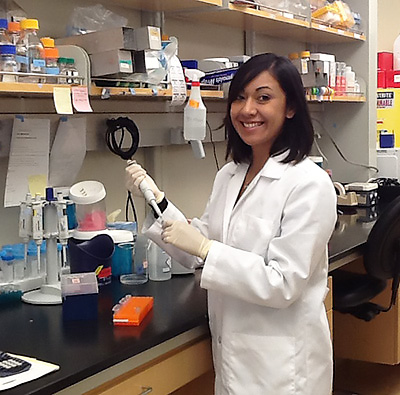Campus News
Long-running UC Santa Cruz program supports diversity in biomedical sciences
Renewal of NIH grant provides $4 million for program supporting underrepresented minority students in biomedical fields.


Sharon Idiga was not particularly interested in doing research when she applied to a UC Santa Cruz program called the Initiative for Maximizing Student Development (IMSD). But IMSD’s eight-week summer workshop on laboratory research changed her mind.
“I was just going to do research to put it on my resume, but as soon as I got started I fell in love with it,” said Idiga, who graduated from UC Santa Cruz in June with a degree in molecular, cell and developmental (MCD) biology. She is starting graduate school in molecular and cellular biology at the University of Iowa this fall.
“At the beginning of that summer, I was telling everyone no way I was going to graduate school, and by the end of the summer I was really thinking about it,” she said.
That’s the kind of outcome the IMSD program aims for, said director Melissa Jurica, a professor of MCD biology. The program’s main goal is to increase the number of underrepresented minority students who receive Ph.D. degrees in the biomedical sciences and related fields. According to Jurica, many undergraduates, especially underrepresented minorities, don’t have a clear idea of what it means to be a scientist and what the career opportunities are.
“This program can turn a student’s life in a direction they never thought possible,” she said.
That was certainly true for Laura Jimenez, who earned her B.S. in MCD biology at UC Santa Cruz in 2009 and is now finishing up a Ph.D. in oncological sciences at the University of Utah while working in a paid internship at Genentech.
“If it wasn’t for IMSD, I wouldn’t be in graduate school,” Jimenez said. “It opened up my eyes to a side of science and medicine that I wasn’t aware of — the idea that I could do research and contribute to people’s lives through the work I do at the lab bench.”
Supportive community
Jimenez grew up in a small agricultural town in the Central Valley and was the first in her family to go to college. She said the IMSD program gave her a supportive community, exposure to research, mentoring, and guidance through the graduate school application process. “It helped me build confidence in myself and identify with being in a research career,” she said. “Some of the graduate students who mentored me were Latinos and the first in their family to go to college, and that inspired me.”
The National Institutes of Health (NIH) has been supporting the IMSD program at UC Santa Cruz since 1999, and for ten years before that when it was known as the Minority Biomedical Research Support (MBRS) program. The program’s grant was renewed again this year, providing over $800,000 per year for the next five years. The Division of Physical and Biological Sciences provides additional funding as well as staff support through the division’s STEM Diversity Office.
IMSD supports both undergraduates and graduate students. The program currently funds 23 undergraduates in their junior and senior years (covering their salaries for lab research), and provides tuition and stipends for 11 graduate students (9 funded by the IMSD grant and two funded by the Graduate Division). The undergraduate program starts with the intensive summer training institute, then gives students the opportunity for real research experience in a faculty laboratory. Idiga, for example, did research in the lab of Pradip Mascharak, professor of chemistry and biochemistry, and coauthored a paper in a scientific journal, with another paper pending. “I had great mentors and really felt like I was part of the research lab,” she said.
For both undergrads and graduate students, the IMSD program provides workshops, career advice, personal counseling, and a supportive and welcoming community for underrepresented minority students. “As an African American and a woman in the sciences, I didn’t see a lot of people who looked like me in my classes, so it was nice to be part of a close scientific community with people who were more like me,” Idiga said.
Peer mentoring
Finding a cohort of peers for advice and support is an essential ingredient for the success of both undergraduates and graduate students, said Blake Riggs, who earned a B.S. in marine biology and a Ph.D. in MCD biology at UC Santa Cruz, with support from IMSD as a graduate student. Now an assistant professor of cell and molecular biology at San Francisco State University, Riggs has studied the role of near peer mentoring in improving outcomes of traditionally underrepresented students in STEM. “We found that with near peer mentoring, our mentors showed as many benefits as the mentees,” he said.
Riggs, one of 35 IMSD alumni now in faculty and other leadership positions at institutions around the country, said that increasing faculty diversity will help drive increased participation of minorities in STEM-related research careers. “The way to raise diversity in the sciences is to raise the representation of minorities on the faculty,” he said.
According to Jurica, underrepresented minorities make up a growing proportion of students in biomedical majors at UC Santa Cruz, now accounting for more than one-third of declared and proposed majors. The IMSD program has an important role to play in helping those students to succeed at UCSC and ultimately pursue careers in biomedical research, she said.
“The number of undergraduates in our program who enter graduate school directly has been on an upward trajectory, close to 50 percent in the last two years,” Jurica said. “We’re continuing to improve the program to better serve our students, and at the same time our population of students is growing, so we need to keep growing the program.”